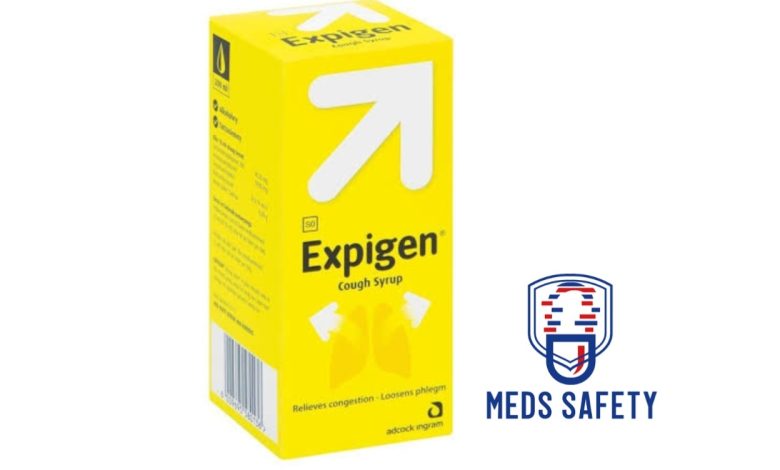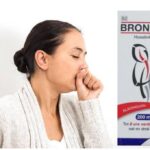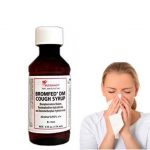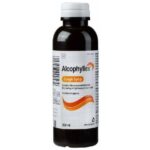Expigen Cough Syrup: Ingredients, Uses, Dosage, Side Effects

Expigen cough syrup is a medication used to relieve airway congestion by stimulating the production of thinner mucus and facilitating its removal from the re.spiratory tract
Expigen Cough Syrup contains the following ingredients in each 10 ml dose:
- Sorbimacrogol laurate 300: 36.33 mg
- Ammonium chloride: 34.00 mg
- Preservative: Sodium benzoate (0.12% m/v)
- Contains sugar: Sucrose 6.00 g
Expigen cough syrup offers several potential benefits for individuals experiencing coughs associated with various respiratory conditions. Some of the potential benefits of Expigen cough syrup include:
1. Cough relief: Expigen cough syrup is formulated to provide relief from coughing. It contains ingredients that help to soothe the respiratory tract and suppress the cough reflex, providing temporary relief from cough symptoms.
2. Expectorant action: Expigen cough syrup contains Ammonium chloride, which acts as an expectorant. This ingredient helps to thin and loosen mucus or phlegm in the respiratory tract, making it easier to cough up and clear from the airways.
3. Mucus clearance: By promoting the clearance of mucus, Expigen cough syrup can help alleviate congestion and facilitate easier breathing. It can be particularly beneficial for individuals with productive coughs accompanied by thick and sticky mucus.
4. Soothing properties: Expigen cough syrup may contain ingredients that have soothing properties, providing relief from throat irritation and soreness commonly associated with coughing.
5. Enhanced comfort: By reducing the frequency and intensity of coughing, Expigen cough syrup can help improve overall comfort, allowing individuals to rest and sleep better.
It is important to note that the specific benefits and effectiveness of Expigen cough syrup may vary from person to person, depending on the underlying cause and severity of the cough. Additionally, it is always advisable to consult with a healthcare professional or pharmacist for personalized advice regarding the use of Expigen cough syrup and to determine if it is appropriate for your specific condition.
Expigen cough syrup is manufactured by Adcock Ingram and comes in a pack size of 200ml. It contains no tartrazine or alcohol.
Expigen Cough Syrup Dosage
- Adults: Take 5 ml to 10 ml of Expigen cough syrup three to six times a day.
- Children over three years old: Take 5 ml of Expigen cough syrup
Expigen cough syrup should be kept in the mouth for a few minutes and it should not be taken together with food or beverages.
Can a pregnant woman take Expigen cough syrup?
Pregnant women should exercise caution when taking any medication, including cough syrups like Expigen cough syrup. It is always recommended to consult with a healthcare professional before using any medication during pregnancy to ensure the safety of both the mother and the developing fetus.
Ammonium chloride the main active ingredient in Expigen cough syrup is classified as a pregnancy category C medication by the U.S. Food and Drug Administration (FDA). This means that there are no well-controlled studies in pregnant women, and the potential benefits and risks of using Ammonium chloride during pregnancy should be carefully considered by a healthcare professional.
The healthcare professional can evaluate the individual’s medical history, the stage of pregnancy, and the severity of the cough to determine the appropriateness of using Expigen or recommend alternative treatments.
In general, healthcare professionals tend to recommend non-medical remedies first to alleviate cough symptoms during pregnancy, such as staying hydrated, using a humidifier, using saline nasal sprays, and practicing good respiratory hygiene. These measures can help reduce the need for medication.
Ultimately, the decision to use Expigen cough syrup or any medication during pregnancy should be made in consultation with a healthcare professional who can provide personalized guidance based on the individual’s unique circumstances and medical history.
Can a breastfeeding woman take Expigen cough syrup?
When it comes to taking medications while breastfeeding, it is always recommended to consult with a healthcare professional before using any medication, including cough syrups like Expigen. While specific information on the safety of Expigen cough syrup during breastfeeding may not be readily available, there are some general considerations to keep in mind:
1. Limited transfer to breast milk: The extent to which medications transfer into breast milk can vary. Some medications may pass into breast milk in small amounts, while others may pass in higher concentrations. It is important to consider the potential exposure of the infant to any medication.
2. Potential effects on the infant: Certain medications can have effects on the nursing infant, such as sedation or changes in feeding patterns. It is crucial to assess the potential risks versus benefits of taking a medication while breastfeeding.
3. Consider alternative treatments: In some cases, healthcare professionals may recommend non-medical remedies or alternative medications that are considered safer during breastfeeding. These may include natural remedies, lifestyle modifications, or other cough suppressants or expectorants that have a better safety profile during breastfeeding.
Given these factors, it is important to consult with a healthcare professional who can evaluate your specific situation and provide personalized advice regarding the use of Expigen cough syrup while breastfeeding. They can consider the potential risks, benefits, and any alternative options that may be more suitable for you and your nursing infant.
Side Effects of Expigen Cough Syrup
Expigen cough syrup, like any medication, may have potential side effects. It’s important to note that not everyone who uses the cough syrup will experience these side effects, and the likelihood and severity of side effects can vary from person to person. It’s recommended to consult with a healthcare professional or pharmacist for more specific information regarding potential side effects and their management. That being said, here are some possible side effects associated with Expigen cough syrup:
1. Nausea and vomiting: Some individuals may experience feelings of nausea or may vomit after taking Expigen cough syrup. It is advisable to take cough syrup with food to reduce the likelihood of these side effects.
2. Diarrhea or stomach discomfort: Expigen cough syrup, especially due to its sorbitol content, may cause diarrhea or stomach discomfort in some individuals.
3. Allergic reactions: While rare, allergic reactions to Expigen cough syrup are possible. Symptoms of an allergic reaction may include rash, itching, swelling, dizziness, and difficulty breathing. If any allergic reactions are experienced, immediate medical attention should be sought.
4. Drowsiness: Expigen cough syrup may cause drowsiness or sedation in some individuals. It is recommended to avoid driving or operating heavy machinery if these effects occur.
5. Other less common side effects: Other less common side effects may include headache, dizziness, dry mouth, or changes in taste sensation.
It’s important to note that this is not an exhaustive list of side effects, and individuals may experience different reactions. If you notice any unexpected or severe side effects while taking Expigen cough syrup, it is advisable to seek medical attention.
Remember to always follow the recommended dosage instructions provided by the healthcare professional or as mentioned on the product label. If you have concerns about using Expigen cough syrup or experience any adverse effects, it is recommended to consult with a healthcare professional or pharmacist for further guidance.
Interactions
Expigen cough syrup, like any medication, can potentially interact with other medications, substances, or medical conditions. It is important to consult with a healthcare professional or pharmacist to discuss any specific interactions that may be relevant to your individual situation. They can provide personalized advice based on your medical history and current medications. However, here are some general points to consider regarding potential interactions with Expigen cough syrup:
1. Drug Interactions: Expigen cough syrup may interact with certain medications, such as:
• Antidepressants or anti-anxiety medications: Expigen cough syrup may enhance the sedative effects of these medications, increasing the risk of excessive drowsiness.
• Monoamine oxidase inhibitors (MAOIs): Combining Expigen cough syrup with MAOIs may lead to a potentially dangerous increase in blood pressure.
• Other cough or cold medications: Taking multiple cough or cold medications simultaneously may result in an overdose of certain ingredients. It is essential to read labels carefully and avoid duplicating active ingredients.
2. Medical Conditions: Expigen cough syrup may not be suitable for individuals with certain medical conditions. It is important to inform your healthcare professional or pharmacist if you have:
• Liver or kidney disease: Expigen cough syrup may require dosage adjustments in individuals with impaired liver or kidney function.
• Asthma or chronic obstructive pulmonary disease (COPD): Expigen cough syrup may not be recommended for individuals with these conditions, as it may thicken mucus in some cases.
• Diabetes: Expigen cough syrup contains sugar (sucrose), which may impact blood glucose levels. Individuals with diabetes should consider this when using the syrup.
3. Substances: Certain substances, such as alcohol, may interact with Expigen cough syrup and increase the risk of sedation or drowsiness. It is advisable to avoid alcohol while taking this medication.
Again, these are general considerations, and it is crucial to consult with a healthcare professional or pharmacist who can assess your specific situation and provide accurate information regarding potential interactions with Expigen cough syrup. They will be able to provide guidance based on your individual needs and medical history.





